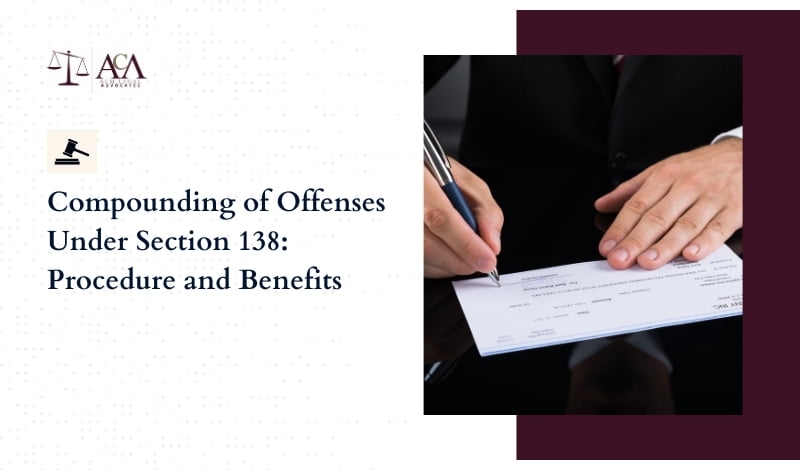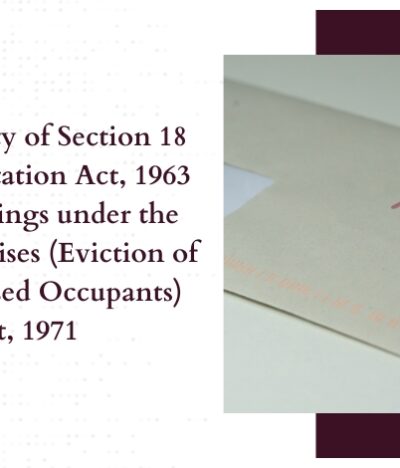What are the implications of a bounced cheque in India? Cheque dishonour cases under Section 138 of the Negotiable Instruments Act are a significant concern in India’s financial and legal systems. The compounding of offences under Section 138 NI Act provides a legal remedy that benefits both the complainant and the accused, facilitating a quicker resolution compared to traditional litigation. Understanding the procedure and benefits of compounding offenses can help the parties involved navigate this complex legal landscape more effectively.
Section 138 NI Act procedure outlines the steps required to handle cases of cheque dishonour, where a cheque issued for the discharge of any debt or liability is returned by the bank unpaid due to insufficient funds or other reasons. This section makes such acts punishable, reflecting the importance of maintaining financial discipline and trust in commercial transactions.
Understanding Section 138 of the Negotiable Instruments Act
Section 138 of the Negotiable Instruments Act plays a pivotal role in upholding financial accountability and trust in commercial transactions. It specifically addresses the legal repercussions of cheque dishonour, making it a punishable offence under Indian law. This section aims to ensure that cheques, a common financial instrument, retain their reliability and credibility in business dealings.
Detailed Explanation of Section 138
Section 138 NI Act procedure stipulates that any person who issues a cheque to discharge a debt or liability and fails to ensure its clearance due to insufficient funds or other reasons is liable for criminal prosecution. The essential elements of an offence under Section 138 include:
- Cheque Issuance: The drawer issues a cheque to the payee for the discharge of a legally enforceable debt or liability.
- Presentation of Cheque: The payee presents the cheque to the bank within its validity period, typically within six months from the date of issuance.
- Dishonour of Cheque: The bank returns the cheque unpaid due to insufficiency of funds or other reasons.
- Notice of Dishonour: The payee issues a written notice to the drawer within 30 days of receiving the bank’s memo, demanding payment of the cheque amount.
- Failure to Pay: The drawer fails to make the payment within 15 days of receiving the notice, constituting an offense under Section 138.
Enforcement and Compliance
Enforcing Section 138 NI Act procedure requires meticulous adherence to legal formalities, such as issuing the demand notice and filing the complaint within prescribed timelines. Legal practitioners play a crucial role in guiding their clients through this process, ensuring that all procedural requirements are met to establish a strong case for prosecution or compounding.
Understanding Section 138 of the Negotiable Instruments Act is essential for legal professionals, businesses, and individuals engaged in financial transactions. It not only underscores the importance of financial integrity but also provides a legal recourse to address and resolve disputes arising from cheque dishonour effectively.
What is Compounding of Offences?
Compounding of offences under Section 138 of the Negotiable Instruments Act offers a significant alternative to lengthy court proceedings, allowing the parties involved to settle disputes amicably and efficiently. This legal provision is crucial for mitigating the burden on the judiciary and providing a quicker resolution for both the complainant and the accused.
Compounding in the legal context refers to a procedure where the complainant and the accused agree to settle the matter, thereby stopping further legal action. Section 147 of the NI Act explicitly allows for the compounding of offenses under Section 138, overriding the general criminal procedure code provisions that usually govern the compounding of offences.
Difference Between Compounding and Settlement
While compounding of cheque dishonour cases involves a legal process recognized by the court, a settlement is a broader term that can occur outside the legal framework without necessarily involving the judicial system. Compounding ensures that the legal consequences of the offence are nullified upon mutual agreement and court approval, which is particularly beneficial in maintaining the complainant’s right to compensation and the accused’s relief from prosecution.
The Negotiable Instruments Act compounding process significantly impacts the judicial system by reducing the number of cases that proceed to full trial. By allowing for the compounding of offences, the courts can focus on more severe and complex cases, thereby enhancing overall judicial efficiency. This process also benefits the parties involved by providing a faster resolution and reducing the legal expenses associated with prolonged litigation.
Legal Procedure for Compounding Under Section 138
The compounding of offences under Section 138 of the Negotiable Instruments Act follows a well-defined legal procedure that ensures a systematic resolution of cheque bounce cases. This process involves several steps and adherence to specific guidelines to facilitate an amicable settlement between the complainant and the accused.
Step-by-Step Guide to the Compounding Process
Step 1: Filing the Complaint
The legal procedure begins when the complainant files a complaint under Section 138 NI Act procedure after the cheque is dishonoured. The complaint must be filed within 30 days from the date the demand notice period expires, as stipulated in the NI Act.
Step 2: Issuance of Summons
Upon receiving the complaint, the court issues a summons to the accused, directing them to appear before the court. The court’s jurisdiction is determined based on where the cheque was presented for payment, where it was dishonoured, or where the notice demanding payment was served.
Step 3: Application for Compounding
Both parties can then move to compound the offense. The application for compounding of cheque dishonour cases can be made at any stage of the legal proceedings, including during the trial or at the appellate stage. The Supreme Court, in the Damodar S. Prabhu v. Sayed Babalal H. case, laid down guidelines encouraging early compounding to minimize litigation costs and court time.
Step 4: Court’s Role in Compounding
The court plays a crucial role in the compounding process. It assesses whether the conditions for compounding are met, such as ensuring that the accused has compensated the complainant adequately. According to the Meters and Instruments Pvt. Ltd. v. Kanchan Mehta ruling, the court can permit compounding even without the complainant’s consent if fair compensation is provided.
Step 5: Agreement and Settlement
Once the court approves the compounding application, both parties must sign a written agreement detailing the settlement terms. This agreement is then submitted to the court. The legal framework for compounding offences ensures that the settlement is legally binding and enforceable.
Step 6: Quashing of Proceedings
Upon successful compounding, the court quashes the criminal proceedings against the accused. This step is crucial as it formally ends the legal action, providing relief to both parties. The court’s order quashing the case ensures that the accused is no longer subject to criminal prosecution for the same offence.
Benefits of Compounding Offences
The compounding of offences under Section 138 of the Negotiable Instruments Act presents several significant benefits for both the complainant and the accused, providing a practical and efficient alternative to prolonged litigation. These advantages underscore the importance of this legal provision in resolving cheque dishonor disputes.
Advantages for the Complainant
Speedy Resolution
One of the primary benefits for the complainant in compounding of cheque dishonor cases is the expedited resolution. Traditional litigation can be time-consuming and costly, but compounding allows for a quicker settlement, ensuring that the complainant receives compensation without enduring lengthy court processes.
Guaranteed Compensation
The Section 138 NI Act procedure for compounding ensures that the complainant is compensated adequately. The court typically requires the accused to pay the cheque amount along with any interest or additional costs before approving the compounding agreement. This guarantees that the complainant’s financial loss is addressed promptly.
Reduced Legal Expenses
Engaging in prolonged legal battles can be expensive. The legal framework for compounding offenses reduces these costs by facilitating an early settlement. This financial relief is particularly beneficial for small businesses and individuals who might find extended litigation financially draining.
Advantages for the Accused
Avoiding Criminal Record
One of the significant advantages for the accused in the compounding of offences under Section 138 NI Act is avoiding a criminal record. Successful compounding results in the quashing of criminal proceedings, allowing the accused to clear their name and avoid the long-term consequences of a criminal conviction.
Reduced Litigation Costs
Similar to the complainant, the accused also benefits from reduced legal expenses. By opting for compounding, the accused can avoid the high costs associated with prolonged court battles, including legal fees and other related expenses.
Opportunity for Amicable Settlement
Compounding offers the accused an opportunity to settle the dispute amicably with the complainant. This not only helps in resolving the current issue but also maintains business relationships, which can be crucial for ongoing and future transactions.
Conclusion
The compounding of offenses under Section 138 NI Act is a vital legal mechanism for resolving cheque dishonor cases efficiently, offering significant benefits for both complainants and the accused. This process ensures timely compensation and avoids prolonged litigation, reducing legal costs and providing a quicker resolution. By allowing for the settlement of disputes without a criminal record for the accused, it maintains business relationships and promotes financial discipline. The Negotiable Instruments Act compounding process also alleviates the judiciary’s burden, enhancing judicial efficiency.
Expert Legal Guidance on Compounding of Offences
For expert guidance on criminal laws, including the intricacies of the compounding of offenses under Section 138 NI Act, trust ACM Legal. Our team specializes in navigating the Section 138 NI Act procedure and the legal framework for compounding offences, ensuring a smooth resolution of cheque dishonour cases. Benefit from our deep understanding of the Negotiable Instruments Act compounding process and let us help you achieve a swift and fair settlement.
FAQs
1. What is the compounding of offenses under Section 138 NI Act?
The compounding of offences under Section 138 NI Act refers to the process where the complainant and the accused mutually agree to settle a cheque dishonour case outside of court. This legal provision allows for an amicable resolution, avoiding prolonged litigation and ensuring compensation for the complainant.
2. What is the procedure under Section 138 NI Act?
The Section 138 NI Act procedure involves the issuance of a cheque for the discharge of debt, presentation of the cheque, dishonour of the cheque, issuing a notice to the drawer, and filing a complaint if the drawer fails to make payment within 15 days of the notice. This process must be strictly followed to establish a case under Section 138.
3. What is the legal framework for compounding offenses under the NI Act?
The legal framework for compounding offences under the NI Act is outlined in Section 147, which allows for the compounding of offenses notwithstanding the provisions of the Criminal Procedure Code. This framework facilitates the resolution of cheque dishonour cases through mutual agreement between the parties involved.
4. How does the compounding of cheque dishonor cases work?
The compounding of cheque dishonour cases works by allowing the accused to compensate the complainant for the dishonored cheque amount along with any agreed-upon interest or costs. Upon successful compounding, the court quashes the criminal proceedings, effectively resolving the case.
5. What are the benefits of the Negotiable Instruments Act compounding process?
The Negotiable Instruments Act compounding process offers several benefits, including a speedy resolution, reduced legal costs, avoidance of a criminal record for the accused, and alleviation of the judiciary’s burden. This process ensures that financial disputes are resolved efficiently and amicably, maintaining business relationships and promoting financial discipline.






